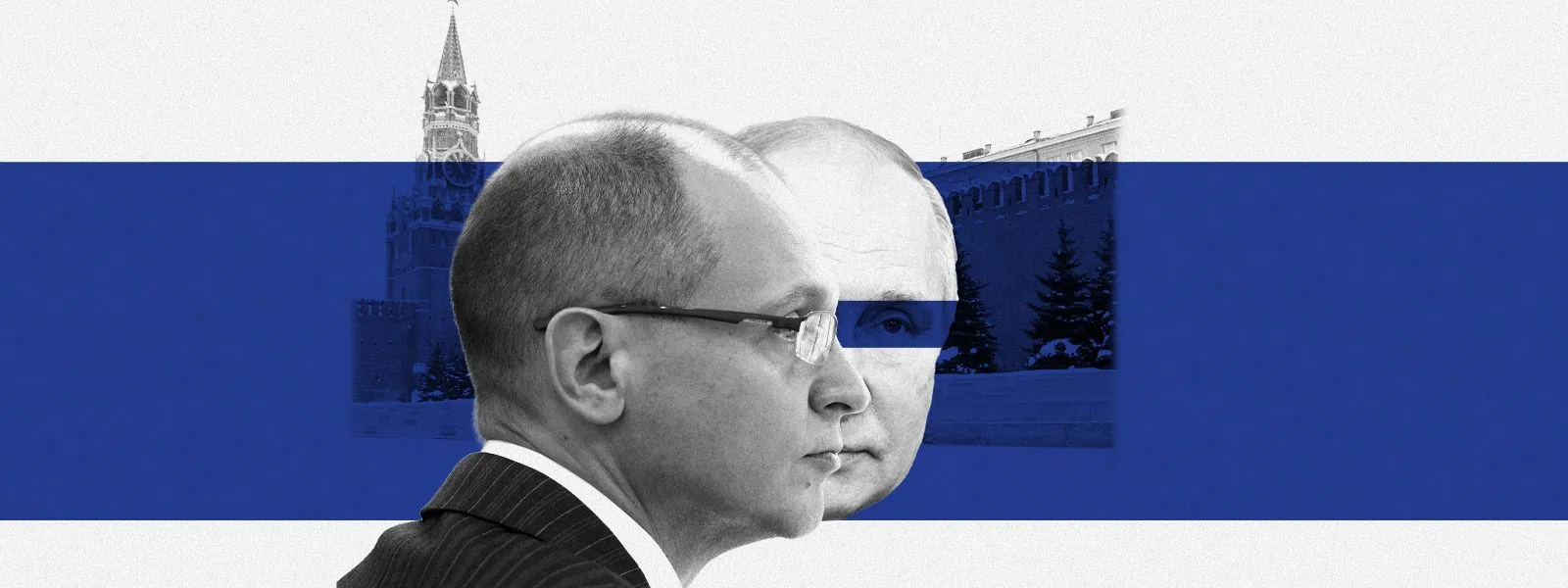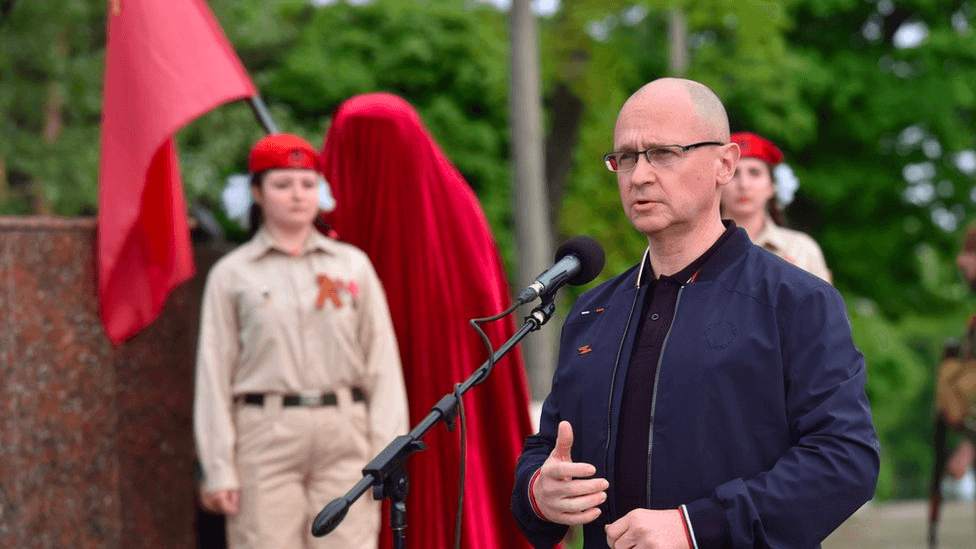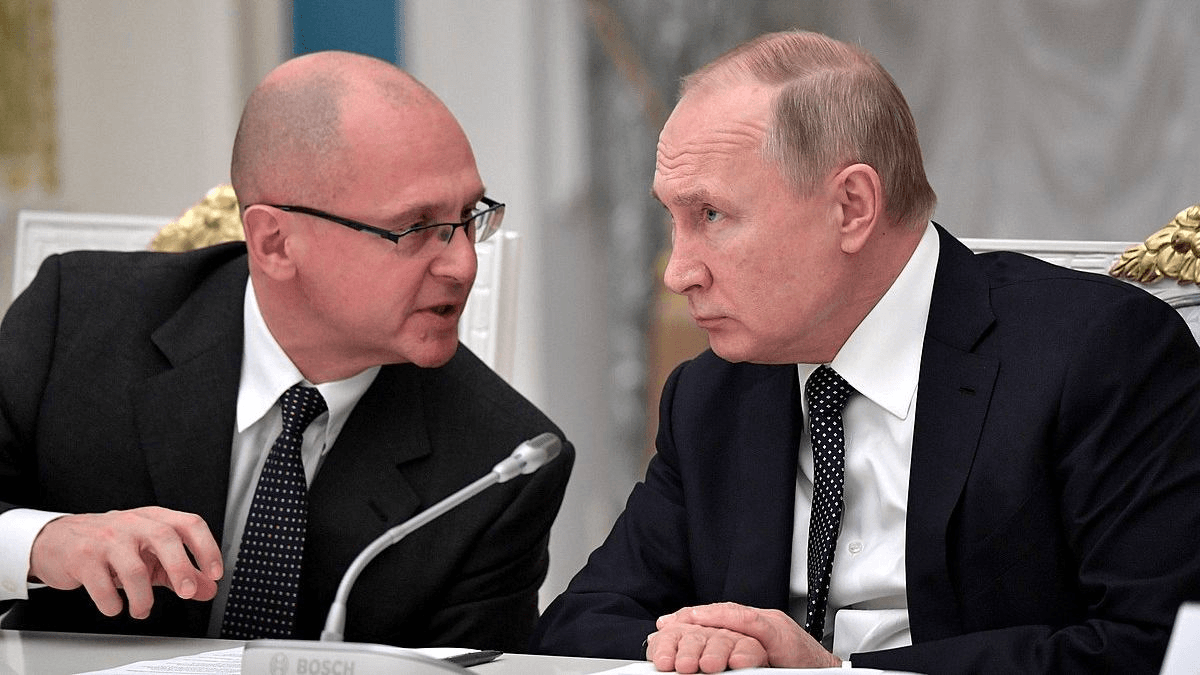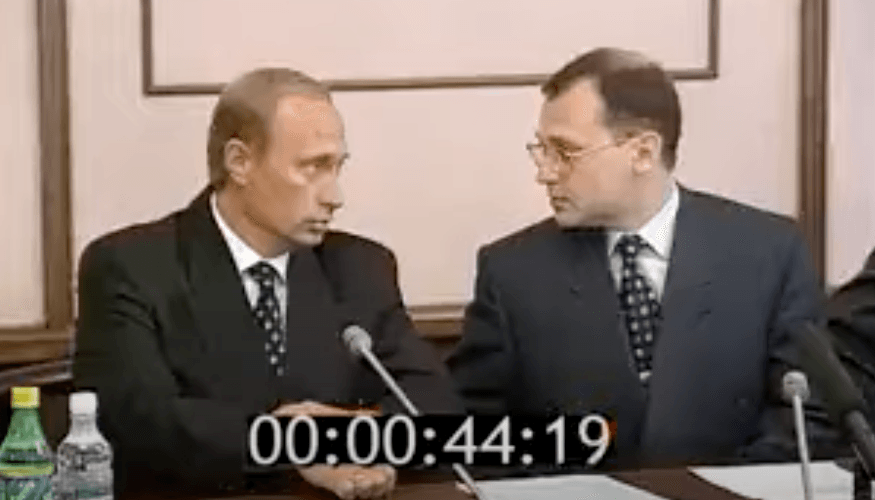Putin’s Potential Successors Part 1: Sergei Kirienko


Editor’s Note: This is an excerpt of a full report. To read the entire analysis with footnotes, click here to download the report as a PDF.
This report focuses on Sergei Kirienko, the First Deputy Chief of Staff of the Presidential Administration of Russia, the most favored candidate to succeed Russian president Vladimir Putin. In this paper, we look at factors that we assess establish Kirienko as the frontrunner for Putin’s role and evaluate his adaptation during the war from a technocrat tasked with achieving the Kremlin’s domestic policy goals to a Kremlin official responsible for the successful integration and management of Ukrainian territories into Russia. The report is most likely of interest to governmental organizations, private sector companies, and non-governmental groups seeking to better understand Russia’s political elite.
Executive Summary
Vladimir Putin is in his fourth term as Russia’s president, having held the role for (a noncontiguous) 18 years. Russia’s next presidential election cycle is in 2024, and while Putin has amended the constitution to permit his rule until he is 84, speculations continue to circulate regarding his declining health at 70 years old. Moreover, as domestic and international pressure continues to mount on Putin 8 months into Russia’s war against Ukraine, Putin’s longevity as the Federation’s president is a key topic of interest for the international community. Insikt Group’s investigation into potential Russian government candidates who are well positioned to be the next leader of Russia starts with the candidate we assess is most likely to assume power if Putin selects his successor: Sergei Kirienko.
Kirienko, the First Deputy Chief of Staff of the Presidential Administration of Russia, is currently the head of Russian domestic policy and has served in Russian public office since 1997. Since the beginning of the full-scale war in Ukraine, Kirienko assumed responsibility for the management and annexation of Russia-occupied regions in Ukraine. This move almost certainly won Kirienko Putin’s favor, advancing him into Putin’s inner circle and distinguishing him from other potential successors. Prior to this, Kirienko’s long-term political career, including his successful tenures at the Presidential Administration, at Rosatom, and as the Presidential Representative to Volga Federal District, has very likely enabled him to prove his prowess as a leader within the Russian government and create critical relationships to promote his success in a higher office. A Kirienko presidency would very likely be defined by his ability to adapt to new realities, avoid conflict, and maintain good relations with key actors. Importantly, Kirienko’s ability to avoid conflict will likely lead him to pursue a more peaceful foreign policy. Domestically, Kirienko’s rule is likely to be an extension of his current policies as the curator of domestic policy, and it is very likely that he would not substantially reform the Russian political system.
Key Judgments
- Kirienko’s role in Russia’s war against Ukraine has almost certainly distinguished him from other members of the Russian elite, enabling him to join Putin’s inner circle and enjoy near-daily access to Putin.
- As a longtime member of the Russian elite with proven loyalty to Putin, Kirienko has established himself as a talented leader with public-facing political experience, which very likely will increase his attractiveness as a potential successor to Putin.
- Kirienko’s relatively good relations with the siloviki faction, the oligarchs, and in-system liberals very likely set him up to be accepted by all major stakeholders of the Russian political elite should he be selected as a Presidential successor.
- A potential Kirienko presidency would likely feature a more peaceful international strategy compared to that of Putin’s foreign policy objectives, with Kirienko instead continuing to prioritize domestic policies.
Kirienko as the Next Tsar
Sergei Kirienko is the likely frontrunner in the successor race due to his support of Putin’s grandiose vision for Russia, his ability to achieve goals set by the Kremlin, and good relations with all major Russian political elite stakeholders. Additionally, Kirienko has near-daily access to Putin in his current position as the curator of Russian domestic policy and newly annexed Ukrainian territories, further strengthening his potential candidacy. Kirienko’s ability to foster Putin’s friendship and trust will very likely lead him to a politically advantageous position.
Support For Putin’s Vision of Russian Grandeur
Kirienko’s lasting and continued support for Putin and his ambitions of a resurgent Russia is one of the most compelling factors when considering his potential successor. By echoing Putin’s statements of rebuilding a “great Russia and reclaiming historic Russian territories”, Kirienko has positioned himself at the forefront of the “war party” that emerged following Russia’s full-scale invasion of Ukraine. He has also made several public statements repeating Putin’s claims that the war was necessitated by North Atlantic Treaty Organization (NATO) expansion and that Russia’s invasion was necessary to “denazify” and demilitarize Ukraine, as well as to liberate the people of Ukraine. These efforts closely aligned Kirienko with Putin’s prioritization of Ukraine.
By at least late April 2022, reports indicated Kirienko made a critical political decision by independently assuming the responsibility for managing and integrating the so-called Donetsk and Luhansk People’s Republics (DPR; LPR) and other Russian-occupied regions into the Russian Federation. He reportedly stepped into this role on his own accord while also maintaining his position as domestic policy curator, further demonstrating Kirienko’s dedication to Putin’s initiatives. Kirienko’s public support of the war and new position improved his standing and won him additional access to Putin, particularly as very few of Russia’s elite or high-ranking officials demonstrated similar dedication to Putin’s priorities. This is evidenced by Kirienko’s ascension to Putin’s inner circle after the start of the war, enabling him to enjoy near-daily access to the Russian president and benefit from the influence that creates.

Figure 1: Kirienko at the opening of the “Grandma for Donbas” statue in Mariupol on May 5, 2022. (Source: BBC)
As the Kremlin’s curator for Russia-occupied territories in Ukraine, Kirienko took responsibility for organizing local governments in these territories. To do this, Kirienko directed Andrey Yarin, Chief of the Presidential Domestic Policy Directorate, to hire policy experts to work in “civilian-military” administrations in new territories occupied by the Russian military. These administrations were primarily tasked with organizing fake referendums to “legally” annex Ukrainian territory into Russia, and they now manage the regions, post-annexation. The highest public appointments under Kirienko’s control were that of Vitaly Khotsenko to the post of Prime Minister of the DPR and Vladislav Kuznetsov to the post of First Deputy Chairman of the LPR government. Both of these individuals were 2019 finalists of Kirienko’s “Leaders of Russia” program, which he created to identify and train the next generation of political leaders. The program has at least 370 graduates, many of whom hold high-level public and private sector positions, including current governors, deputy ministers, and heads of regional ministries, all with continued allegiance to Kirienko for his role in their careers. Kirienko can almost certainly leverage these officials in the future to ensure he has sufficient political momentum and support for his initiatives.
Additionally, in July 2022, Kirienko announced a patronage system for Russian-occupied Ukrainian territories. As a result, several Russian regions were tasked with funding the rebuilding of cities in Russia-occupied regions in Ukraine. Meduza reported that while Moscow and Saint Petersburg were allowed to choose their respective regions to provide patronage, other Russian regions were assigned cities and regions by the Kremlin. As Kirienko is responsible for managing Russian-occupied Ukrainian territories, the newly announced patronage system very likely gives Kirienko further power over Russian governors, including the regional governors of Moscow and Saint Petersburg.
Kirienko the Leader: Before the War
Kirienko’s influence extends beyond his efforts in Ukraine. Before the start of the war, Kirienko was primarily known as one of the Russian government's leading and most effective technocrats. Throughout his extensive career, which has ranged from serving as prime minister of Russia in 1998 to curating Russian domestic policy, Kirienko has solidified himself as an excellent leader capable of achieving the Kremlin’s goals without posing a political threat to Putin. His most prominent successes include the centralization of the Volga Federal District, the revitalization of the Russian nuclear agency Rosatom, and the organization of successful (that is, preferential to Putin) elections in Russia. Kirienko’s ability to achieve the Kremlin’s objectives in each position he has held almost certainly strengthens his candidacy as the most likely successor to Putin.
At the start of his career, Kirienko demonstrated the ability to adapt to new realities and pursue opportunities that springboarded him to the heights of the Russian political environment. Following the collapse of the Soviet Union, Kirienko pursued business opportunities, quickly adapting to a new market economy. In 1993, Kirienko founded and became the chairman of Garantia Bank, where he built close relations with Boris Nemtsov, then-governor of Nizhny Novgorod. This friendship resulted in Kirienko’s bank receiving authorization to conduct financial operations for many of the social programs introduced by Nemtsov. When Nemtsov was appointed as the Minister for Oil and Energy, he brought his protege Kirienko to Moscow to serve as the Deputy Minister for Oil and Energy; it is largely believed, however, that Kirienko directed the ministry himself. In Moscow, Kirienko quickly rose through the ranks, and by March 1998, he became Russia’s youngest prime minister. His tenure, however, was cut short when the government announced a default on Russian foreign debt in August 1998.
Despite his short tenure as the prime minister of Russia, Kirienko proved himself able to take advantage of the new power structure. He further proved his flexibility and prowess as a politician and diplomat when he was appointed as the Plenipotentiary Representative of the President of the Russian Federation in the Volga Federal District in 2000. In this position, Kirienko was tasked with quelling regional autonomy and bringing the district governors under greater control of the Kremlin. In the 5 years he served in this role, Kirienko was able to bring all the regions, including Tatarstan in 2007, under greater Kremlin control.

Figure 2: Kirienko with Vladimir Putin at the meeting of the Russian Pobeda (Victory) Organizing Committee in 2019 (Source: CEPA)
As the head of Rosatom and the curator for domestic policy, Kirienko established himself as a capable leader, able to advance Kremlin interests regardless of the environment. Specifically, as the head of Rosatom, Kirienko effectively navigated the Russian military-industrial complex while building a world-renowned nuclear energy exporter. He centralized the nuclear industry under the umbrella of Rosatom, achieved relative independence from the military, and conquered international nuclear power plant markets. As the curator for Russian domestic policy, Kirienko managed all domestic policy figures, arranged federal and regional level elections, and silenced the opposition.
Kirienko the Diplomat
Throughout Kirienko’s vast career experience, one of his most marked achievements has been maintaining relatively positive relations with the crucial political elites of the Russian government. Good relations with the Russian elite, especially with Putin himself, almost certainly contribute to Kirienko’s candidacy as Putin’s successor. Throughout his entire career, Kirienko established himself as Putin’s loyal supporter. More importantly, Kirienko aided Putin’s rise to power, lobbying for Putin’s appointment as the head of the Federal Security Service of Russia (FSB) in 1998. Relations between the two improved even further after the start of the full-scale invasion of Ukraine, as detailed earlier in this report. For this, his proven loyalty, and help in Putin’s early political career, Kirienko very likely enjoys Putin's protection.

Figure 3: Kirienko announcing Putin’s promotion to the head of the FSB in 1998 (Source: YouTube)
Kirienko also maintains relatively good relations with the siloviki faction as a whole. His first experience with the siloviki, a Russian political class that includes current and former members of the law and security structures, dates back to Kirienko’s Rosatom days, when he had to balance the military with the civilian side of the nuclear industry. These relations became tense as Kirienko was appointed as the curator of Russian domestic policy, a position Kirienko still holds today. In this position, Kirienko works closely with the siloviki to maintain order and peace domestically. While Kirienko ranks higher than anyone in the siloviki faction when it comes to domestic issues, some members individually outrank Kirienko, creating the potential for a power imbalance. However, Kirienko and the siloviki remain in good standing, demonstrating lasting mutual respect.
Since the beginning of the full-scale war in Ukraine, Kirienko has further strengthened this relationship by actively working with the siloviki faction on matters related to Ukraine. As Kirienko took responsibility for the management and the formal annexation of Russia-occupied Ukrainian territories, Kirienko and his team began closely cooperating with the Russian military, intelligence services, and other members of the siloviki faction. The pro-Russian authorities in occupied territories are appointed by Kirienko and his team. These authorities are called military-civilian administrations for their close collaboration with the Russian military, further proving Kirienko’s cooperation with the siloviki faction.
Finally, while Kirienko does not have extensive experience and cooperation with Russian oligarchs, he reportedly maintains close relations with brothers Mikhail and Yury Kovalchuk. The pair are Russian media tycoons, beneficiaries of the Bank of Russia, and Putin’s close friends. The brothers enjoy good relations with a number of the Russian elite, especially among the siloviki faction, including Russian Defense Minister Sergei Shoigu, Secretary of the Security Council of Russia and former head of the FSB Nikolai Patrushev, and First Deputy Director of the FSB Sergei Korolev. Kirienko developed close ties to the brothers during his days as the head of Rosatom. Mikhail Kovalchuk is the president of the Kurchatov Institute, Russia's leading research and development institution in nuclear energy. Their relations appear to extend to their families: Boris Kovalchuk, Yury’s son, briefly served as the deputy general director at Rosatom in 2009, and in 2021, Kirienko’s son Vladimir was appointed as the head of the Kovalchuk-owned VKontakte Russian social media service. It is rumored that the Kovalchuks lobbied for Kirienko’s return to the Kremlin to add another member of the Russian elite to their arsenal.
Outlook
In a scenario where Putin selects his successor, Kirienko’s consistent allegiance to Putin’s strategic priorities and longstanding history of leadership in Russia’s government leaves him well-posed to replace Putin. Moreover, Kirienko’s efforts to support Putin’s objectives regarding the DPR and LPR will very likely protect him from the consequences of additional failures in Ukraine, whereas Russia’s military leaders will almost certainly be subject to Putin’s punishment, as has already been the case with numerous military leaders including Admiral Igor Osipov and General Dmitry Bulgakov. As the situation in Ukraine continues to change rapidly, Kirienko’s proven experience adapting to changing socio-political circumstances will very likely enable him to maintain close relations with Putin, even as that access becomes more limited for higher members of Russia’s elite.
Kirienko’s current and previous roles provide insight into how he would likely approach the presidential office. Kirienko has shown a remarkable capability to adapt to new realities, avoid conflict, and pursue friendly relations with key shareholders to advance his career. This, as well as his current position in office, would very likely define Kireinko’s rule. For example, his strategy of avoiding conflict and making allegiances throughout the Russian government would likely continue as president. This would likely extend to some degree to foreign relations, particularly given Kirienko’s history of embodying technocratic ideals. Moreover, despite Kirienko’s embodying some authoritarian ideals, his history of peace-seeking could improve tensions with the West. Prior to the war, Kirienko largely refrained from speaking about foreign relations, even when he engaged in business that required it at Rosatom. Instead, Kirienko used business deals as tools of foreign policy rather than publicly reflecting his opinion on foreign states, providing him a relatively blank slate for foreign policy priorities in a potential presidency. Lastly, Kirienko’s vast experience with domestic policy will very likely shape his presidency. Unlike Putin, who has largely ignored the domestic situation in Russia, Kirienko would likely expect his current priorities for domestic life, including building a meritocracy-based government, to continue under his presidency.
Notably, Kirienko’s political career has made him an expert at strategically aligning himself with important figures. Particularly as he stood with Putin during Russia’s full-scale invasion of Ukraine, Kirienko’s statements have strongly advocated in favor of the war and appear to reflect the viewpoint of the current administration. However, whether this is solely to gain Putin’s favor or reflects his true sentiments on the issue remains unclear.
Upcoming Insikt Group reports will investigate some of Putin’s alternate choices for president, including Alexey Dyumin, the current governor of Tula and former chief security guard of Putin, Sergei Sobianin, the mayor of Moscow, Sergei Korolev, the First Deputy Director of the FSB, and Igor Sechin, the head of Rosneft and unofficial head of the siloviki faction. We will also provide overviews of well-known candidates we assess are less likely to be appointed, such as Dmitry Medvedev, deputy chairman of Russia’s Security Council and former president and prime minister of Russia, Vyacheslav Volodin, chairman of the State Duma; and Sergei Shoigu, defense minister of Russia.
Related